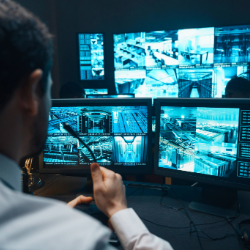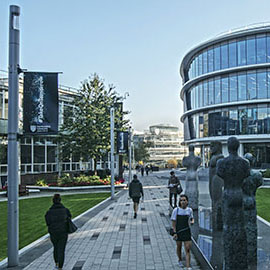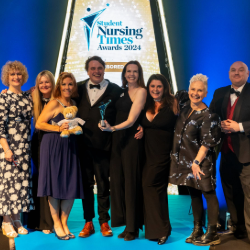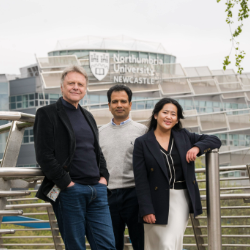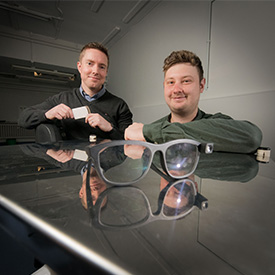-
Study
Study
Interested in studying at Northumbria? With 31,500 students, Northumbria is one of the largest universities in the country, offering courses on either a full-time, part-time or distance learning basis.
Discover more-
Undergraduate
- Undergraduate Study Degree
- Undergraduate Open Day & Events
- Application Guides
- Northumbria University UCAS Exhibitions
- Foundation Years
- Undergraduate Fees & Funding
- School & College Outreach
- Continuing Professional Development
-
Postgraduate
- Postgraduate Study Degree
- Postgraduate Research Degrees
- Postgraduate Open Days and Events
- Postgraduate Fees & Funding
- Flexible Learning
- Thinking about a Masters?
- Continuing Professional Development
- Change Direction
-
Student Life
- The Hub - Student Blog
- Accommodation
- Life in Newcastle
- Support for Students
- Careers
- Information for Parents
- Students' Union
- Northumbria Sport
-
-
International
International
Northumbria’s global footprint touches every continent across the world, through our global partnerships across 17 institutions in 10 countries, to our 277,000 strong alumni community and 150 recruitment partners – we prepare our students for the challenges of tomorrow. Discover more about how to join Northumbria’s global family or our partnerships.
Discover more-
Applying to Northumbria
- European Union
- Our London Campus
- Northumbria Pathway
- International Events
- Entry Requirements
- Agent Network
-
Northumbria Language Centre
- Faculty Requirements
- Acceptable English Requirements
- Pre-Sessional English and Study Skills
- Academic Language Skills Programmes (ALS)
-
International Fees, Funding & Scholarships
- International Undergraduate Fees
- International Undergraduate Funding
- International Masters Fees
- International Masters Funding
- International Postgraduate Research Fees
- International Postgraduate Research Funding
- International Money Matters
-
Life at Northumbria
- International student support
- The Hub - Student Blog
- Careers
-
International Mobility
- Current Northumbria Students
- Incoming Exchange Students
-
-
Business
Business
The world is changing faster than ever before. The future is there to be won by organisations who find ways to turn today's possibilities into tomorrows competitive edge. In a connected world, collaboration can be the key to success.
Discover more -
Research
Research
Northumbria is a research-rich, business-focused, professional university with a global reputation for academic quality. We conduct ground-breaking research that is responsive to the science & technology, health & well being, economic and social and arts & cultural needs for the communities
Discover more -
About Us
-
About Northumbria
- Our Strategy
- Our Staff
- Our Partners
- Student Profiles
- Alumni Profiles
- Leadership & Governance
- Academic Departments
- University Services
- History of Northumbria
- Contact us
- Online Shop
-
-
Alumni
Alumni
Northumbria University is renowned for the calibre of its business-ready graduates. Our alumni network has over 236,000 graduates based in 178 countries worldwide in a range of sectors, our alumni are making a real impact on the world.
Discover more - Work For Us
What will I learn on this module?
Research for Practitioners is a 40-credit module which spans across semesters one and two.
Forms of digital immersion have emerged due to the convergence of technology and culture and this module introduces key areas of knowledge to critically consider their impact. The module offers a structured introduction to the intellectual frameworks which can be employed to both support and interrogate the impact of digital enfoldment on the individual psyche and wider culture. These fields of knowledge include Philosophy, Media Theory, Art Theory and Art History and you will be guided and supported as you integrate these ideas to critically address the role of Digital and Immersive Arts within contemporary culture. You will also learn about the key philosophical underpinnings of the concept of immersion and will be challenged to reflect on these within your theoretical work.
How will I learn on this module?
You will learn through research-led lectures, seminars and workshops. The lectures will provide you with an introduction to theoretical frameworks and methods from a diverse range of disciplines and introduce the necessary interdisciplinary thinking tools to integrate these to consider Digital and Immersive Arts in critical terms. Through seminars and reading groups you will be supported and guided through a wide range of material drawn from Philosophy, Media Theory, Art Theory and Art History. You will be supported as you read, discuss and integrate these strands of knowledge to critically reflect on the challenges and opportunities Digital and Immersive Arts offers to both the individual psyche and wider culture.
How will I be supported academically on this module?
The programme leader, the module tutors and your project supervisors will all play a role in guiding you throughout the module. You will be guided by tutors with relevant expertise in the intersecting disciplines within the field of Immersive Arts and are either experienced practitioners, researchers or practitioner-researchers. The seminars will provide key moments for tutor and peer feedback on your ideas and will form the basis on which you will be develop your research. Further academic support is provided via e-Learning tools, such as discussion groups, blogs and wikis. Additional contact with tutors will also be available during office hours by arrangement.
Additional support is provided through the English for Specific Academic Purposes (ESAP) module where English is not your first language.
What will I be expected to read on this module?
All modules at Northumbria include a range of reading materials that students are expected to engage with. The reading list for this module can be found at: http://readinglists.northumbria.ac.uk
(Reading List service online guide for academic staff this containing contact details for the Reading List team – http://library.northumbria.ac.uk/readinglists)
What will I be expected to achieve?
Knowledge & Understanding:
• To gain the knowledge in order to introduce appropriate research methodologies, using informed critical approaches and resources relevant to practice. (KU1)
• To demonstrate awareness of inter- disciplinary fields which support and challenge Immersive Arts. (KU3)
Intellectual / Professional skills & abilities:
• To demonstrate systematic analysis of practical and theoretical positions and processes and make clear arguments in written form. (IPSA2)
• To evidence a creative and innovative approach to the creation of new knowledge that directly reflects the key concerns of digital and immersive arts. (IPSA3)
Personal Values Attributes (Global / Cultural awareness, Ethics, Curiosity) (PVA):
• To evidence effective inter-personal and organisational skills, including project planning, live presentation, and time management. (PVA1)
• To demonstrate an understanding and critical engagement with the challenges faced by contemporary culture due to challenges facing contemporary culture including the climate crisis, Late Capital and the encroachment of digital technology. (PVA3)
How will I be assessed?
Formative
Formative assessment will be carried out during the seminars and reading groups where you will discuss artworks, literature, issues and themes which intersect Immersive Arts. Peer and tutor feedback will support critical investigation and dissemination of ideas through presentations.
Summative
In semester one there will be two submissions:
1. Short Essay: A traditional 2500-word research essay systematically analysing the critical challenges of digital and immersive arts within the contemporary context.
2. Visually Rich Research Report: this report should evidence an equivalence in effort, time and the level of research achieved to that of the 2500-word essay. You will produce a research report that combines a professional use of image, moving image, audio and text and establishes your personal critical approach to a key issue of digital and immersive arts. This submission may take various forms including, but not limited to the following: a portfolio, a rich-media presentation, or an annotated video.
In semester two you will have one large submission. You will be given the choice between the following options:
1. Long Essay: A traditional 5000-word research essay systematically analysing the critical challenges of digital and immersive arts within the contemporary context.
2. Visually Rich Research Report: this report should evidence an equivalence in effort, time and the level of research achieved to that of the 5000-word essay. You will produce a research report that combines a professional use of storytelling, image, moving image, audio and text and establishes your personal critical approach to a key issue of digital and immersive arts. This submission may take various forms including, but not limited to the following: a portfolio, a rich-media presentation, or an annotated video. The report will be supplemented by a 500-word written personal reflection.
3. Public Engagement Report: this report should evidence an equivalence in effort, time and the level of research achieved to that of the 5000-word essay. This report is an illustrated, and/or rich-media document that proposes a clear rational for a public engagement activity (e.g., a self-initiated project with a collaborative element, an exhibition, a symposium, or an arts-activist community event). This document should clearly be supported by professional use of communicative / scene setting images and/or rich media indicating how the public would engage with your selected setting/problem/topic. This submission may take various forms including, but not limited to the following: a portfolio, a rich-media presentation, or an annotated video. The report will be supplemented by a 500-word written personal reflection.
These submissions will:
• Demonstrate your knowledge and understanding of the diverse fields of knowledge. (KU1)
• Demonstrate the integration of these diverse fields of knowledge to critically discuss an aspect of Digital and Immersive Arts. (KU3, IPSA2, IPSA3)
• Lay the foundations for the dissertation in semester 3. (PVA1)
Pre-requisite(s)
N/A
Co-requisite(s)
IA7001
IA7002
Module abstract
Contemporary culture is being transformed by technologies which increasingly enfold the individual within networks of digital information and experience. During the first technological phase participants passively engaged with digital information via the computer screen. During the second technological phase mobile phones freed the individual to move away from their computers whilst remaining within the web of media. In the emerging technological phase of immersion, the individual is more fully integrated into the digital as the experience shifts from engaging with a screen to enfolding forms embodied of digital experience.
This module offers a structured introduction to the ideas which can be employed to both support and interrogate the impact of digital enfoldment on the individual psyche and wider culture. These fields of knowledge include Philosophy, Media Theory, Art Theory and Art History and you will be guided and supported as you integrate these ideas to critically address the role of Immersive Arts within contemporary culture. You will also be given the opportunity to participate in research organisations at Northumbria such as The Cultural Negotiation of Science (CNoS). This will provide you with a direct perspective of the conceptual, ethical and practical implications of digital and immersive arts within cross-disciplinary research.
Course info
Credits 40
Level of Study Postgraduate
Mode of Study 1 year full-time
Department Arts
Location City Campus, Northumbria University
City Newcastle
Start September 2024
All information is accurate at the time of sharing.
Full time Courses are primarily delivered via on-campus face to face learning but could include elements of online learning. Most courses run as planned and as promoted on our website and via our marketing materials, but if there are any substantial changes (as determined by the Competition and Markets Authority) to a course or there is the potential that course may be withdrawn, we will notify all affected applicants as soon as possible with advice and guidance regarding their options. It is also important to be aware that optional modules listed on course pages may be subject to change depending on uptake numbers each year.
Contact time is subject to increase or decrease in line with possible restrictions imposed by the government or the University in the interest of maintaining the health and safety and wellbeing of students, staff, and visitors if this is deemed necessary in future.
Your Learning Experience
Find out about our distinctive approach at
www.northumbria.ac.uk/exp
Admissions Terms and Conditions
northumbria.ac.uk/terms
Fees and Funding
northumbria.ac.uk/fees
Admissions Policy
northumbria.ac.uk/adpolicy
Admissions Complaints Policy
northumbria.ac.uk/complaints





